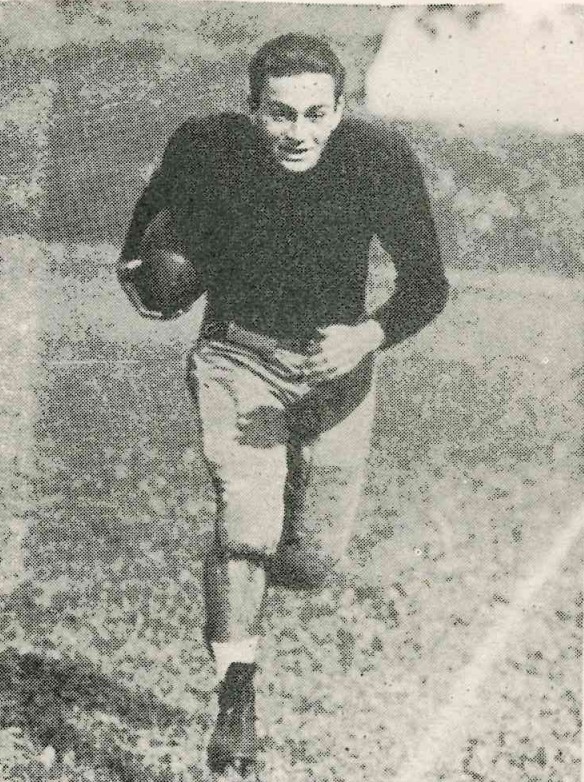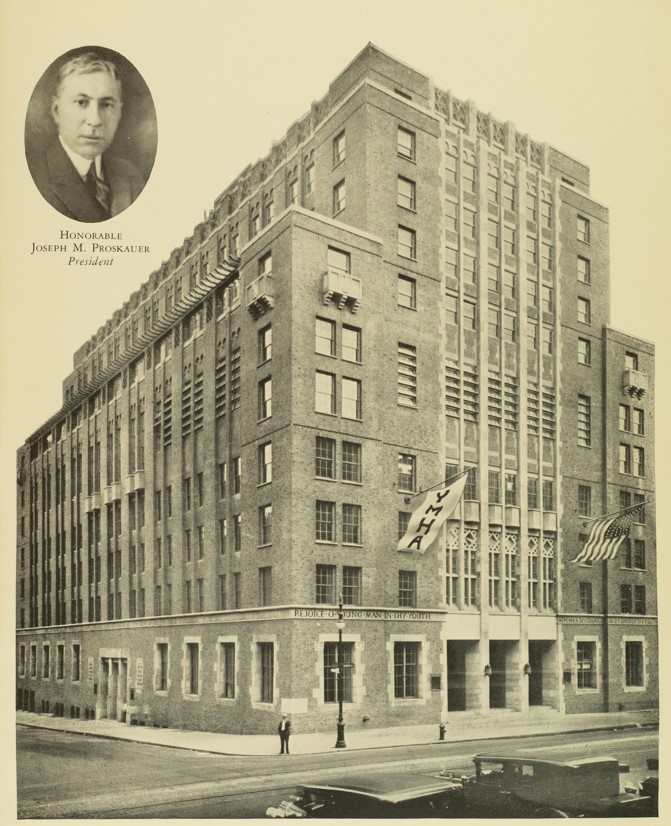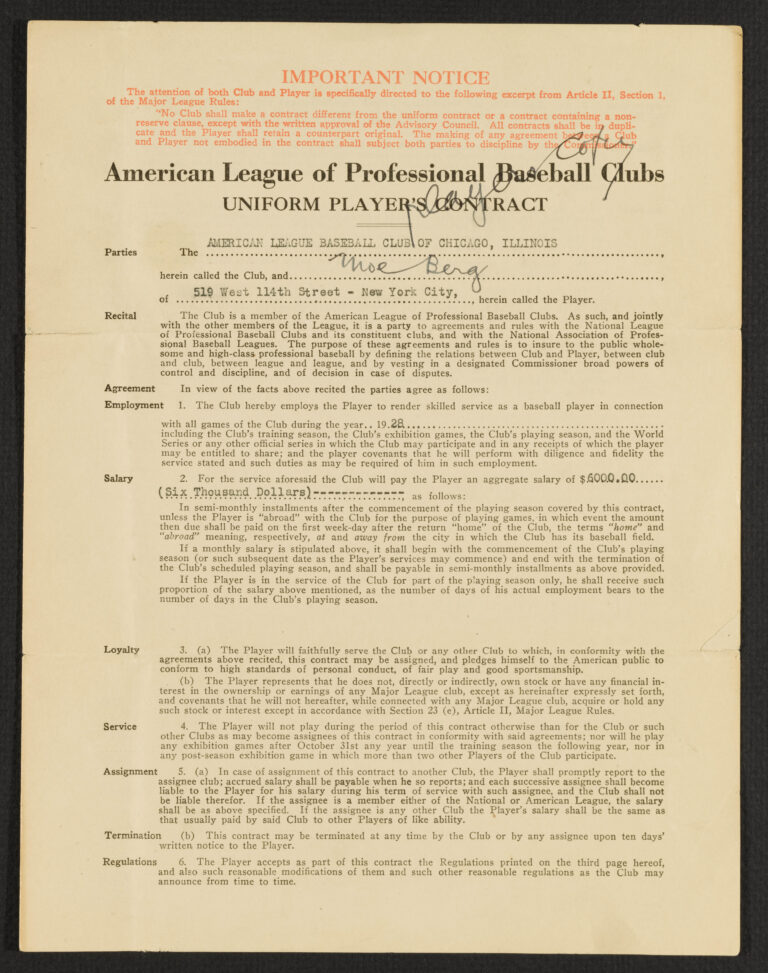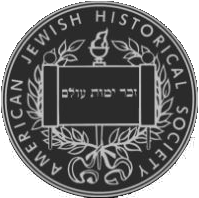In a broadcasting career spanning 55 years, Marty Glickman (August 14, 1917 – January 3, 2001) was the play-by-play announcer of the Knicks for 21 years, the football Giants for 23, Yonkers Raceway for 12, and the Jets for 11.[1] He was a mentor to another New York-turned-national sports broadcasting icon in Marv Albert.[2] But Glickman’s involvement with sports was not limited to calling the action.

Before sportscasting, Glickman was a track star at Syracuse University, and made the U.S. track team as a sprinter for the 1936 Summer Olympics Games in Berlin. In an oral history with AJHS in 2000 (accession numbers 6666.012.003a, b, and c), Glickman recalls when he and teammate Sam Stoller, the only two Jews on the team, were not going to run in the 4 x 100-meter relay.
On the morning of the day of the race, the sprinters were called into a meeting. Glickman and Stoller would be replaced by Jesse Owens and Ralph Metcalfe, supposedly out of fears that the German team was hiding their best sprinters for that race. Owens objected, saying he had already won three gold medals (in the 100, 200-meter sprints, and the long jump) and that Glickman and Stoller deserved to run, but assistant coach Dean Cromwell forced the issue, saying “You’ll do as you’re told.”[3] Owens won his fourth gold medal as the American team finished with a then-world-record 39.8 seconds, while the German team finished third with 41.2 seconds (after the Dutch team was disqualified for running out of their lane).
Glickman said the decision to remove him and Stoller from the race was because of anti-Semitism. He believed American Olympic Committee (now the United States Olympic Committee) head Avery Brundage chose to sit them as a means of appeasing German Chancellor Adolf Hitler by sparing him the embarrassment of seeing two American Jews on the winner’s podium.[4] In 1998, Glickman received the first Douglas MacArthur Award from the USOC in lieu of the gold medal he was prevented from receiving (Stoller had already passed in 1985).[5]
Glickman remained understandably angry that he was denied what many would see as one of the greatest sporting accomplishments. Nonetheless, he maintained a friendship with Owens after the 1936 games. Occasionally, Glickman would broadcast track meets, and if they were at the same meet, the two would catch up to one another, and eventually Glickman would attend Owens’ funeral in 1980. Despite a moment of blatantly unfair treatment that followed him until the end of his life, Glickman became one of the voices of the New York sports world, and his story remains one of triumph for Jewish Americans in sports.
On November 2nd, 2023 AJHS hosted a book talk for Marty Glickman: The Life of an American Jewish Sports Legend with author Jeffrey S. Gurock moderated by Beth Wenger. A recording of the program is available to view below, as well as on Jewish Broadcasting Service (JBS).
In his talk, Jeffrey discusses why he wanted to tell Marty Glickman’s story. He recalls how sports was a large part of his life when growing up, and by extension, so was Glickman’s commentary. He talks about how he worked to mine multiple different sources to create a narrative, and how he sometimes had to use his own intuition to derive an accurate account from conflicting stories –including some conflicting stories in Glickman’s own memoirs and oral histories. Jeffrey also talks about the 1936 Olympic Games and Brundage’s sidelining of Glickman and Stoller from the relay, and how Glickman initially staying silent about because of a desire by Jews at the time to fit in by not speaking out. Jeffrey discusses the narrative of Owens’ and Metcalfe’s story of triumph by two African-American men and how it intersects with Glickman’s and Stoller’s benching, and how discrimination against minorities, racial or religious, can apply at different times. Jeffrey also discusses how Glickman was a mentor for future sports broadcasters, telling a story of how one of his disciples, Bob Costas, went off-script in defiance of the International Olympic Committee to acknowledge the 40th anniversary of Israeli athletes and coaches murdered at the 1972 Olympic Games in Munich, hoping Glickman would have been proud of such a stand against the discrimination of others.
Topics covered in this program: Sports, football, second generation Jews, assimilation, radio, sports broadcasting, research, turning sources into narrative, 1936 Olympics, overcoming antisemitism, discrimination at the Olympic games.
[1] https://www.espn.com/classic/s/obit_glickman_marty.html
[2] https://nypost.com/2023/10/07/voice-of-the-knicks-marty-glickman-faced-discrimination/
[3] Mark Aaron Productions, and AJHS. Marty Glickman, Tape 1A-3A, 2000. Accession# 6666.012.003a, b, and c
[4] https://www.nytimes.com/2001/01/04/sports/marty-glickman-announcer-and-blocked-olympian-83.html
[5] https://www.nytimes.com/1998/03/30/sports/olympics-glickman-shut-out-of-1936-games-is-honored-at-last.html




